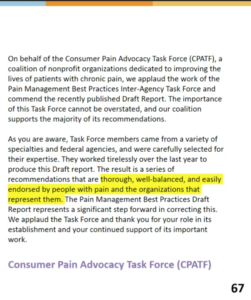
Golden, left, and Steinberg.
On May 9 and 10, the Pain Management Best Practices Inter-Agency Task Force–an advisory group convened by Congress and overseen by U.S. Department of Health and Human Services (HHS)–held its last public meeting to finalize a report on improving pain care in America. The task force, comprised of 29 members, includes Cindy Steinberg, U.S. Pain’s National Director of Policy and Advocacy, the only patient and patient advocacy representative.
Task Force Chair Vanila Singh, MD, Chief Medical Officer for the Office of the Assistant Secretary for Health at HHS and a pain physician, led the meeting.
The first day of the meeting began with remarks from U.S. Rep. Phil Roe and Brett Giroir, MD, Assistant Secretary for Health at HHS. Members also heard perspectives from the public during a 30-minute open comment section; many of the speakers were people with pain.
In the afternoon, Dr. Singh reviewed feedback received during the second 90-day comment period, and the overall scope of work to date. Notably, she highlighted the comments of the Consumer Pain Advocacy Task Force (CPATF)–a coalition of pain patient-related nonprofits, including U.S. Pain Foundation–which submitted a joint letter with suggestions and largely approved of the report.
Following that discussion, the task force spent a significant portion of time deliberating over last, technical edits to the document.

The CPATF’s comments were highlighted in the presentation by Dr. Singh.
Perhaps the most impactful segment was an hour featuring the stories of six patients with pain. Among them was U.S. Pain Migraine Advocacy Liaison Katie Golden, who spoke eloquently of her struggle with debilitating chronic migraine disease. She shared about her battles to access to effective treatment and encouraged the task force to recognize that patients must be treated as individuals.
Many of the patients who spoke were moved to tears as they shared stories of struggling to find relief.
In closing, task force members were invited to speak before a vote was taken to approve the document.
Steinberg spoke up to thank Dr. Singh for her stewardship of the group and applauded her colleagues for their efforts. She cautioned, though, that a plan for implementation is vital.
“At the end of the day, the report is a piece of paper,” said Steinberg. “It’s going to mean nothing unless people really advocate for change.”
Steinberg also noted that the American Medical Association had released a statement strongly endorsing the report.
The task force then moved to approve the report, with one all but one of the 29 members voting yes. The final report was published on May 30.
